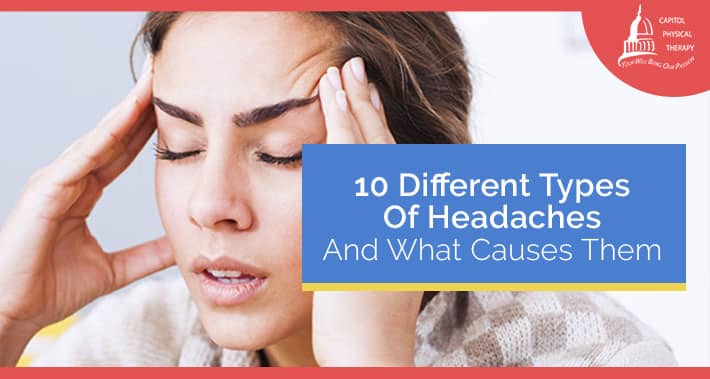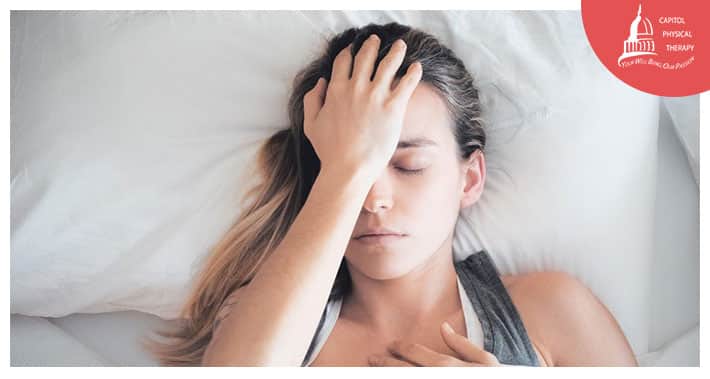
Headaches are never fun.
Depending on the type, they can cause some pretty serious side effects.
They can range from mildly inconvenient, to moderately distracting, to outright debilitating.
If you’ve ever experienced a severe headache or migraine, you might’ve even had to take time off work and avoid all stimuli, such as sound and light.
But how do you figure out the right headache treatment?
Knowing the different types of headaches can help you determine if it’s just something you can take a painkiller for and move on with your day, or if it’s possibly a sign of something more serious.
Being aware of the causes of your headaches can help you to avoid triggers, and help prevent them from happening in the future.
As a physical therapist in Washington DC, here at our clinic we often see patients who would benefit from physical therapy treatments for headaches.
Part of treatment is understanding your type of headache and what’s causing them.
So, keep reading as we explore 10 different types of headaches, and what their causes are.
What Is A Headache?
Most people will experience headaches at some point in time.
Generally speaking, a headache is pain occurring in any region of your head.
However, depending on the type of headache you’re experiencing, they can vary greatly in terms of length, source, and degree of pain.
Headaches can cause chronic pain, meaning symptoms are consistent and long lasting, or acute pain, meaning they only occur every now and then.
If a headache is accompanied by symptoms such as a stiff neck, rash, vomiting, or disorientation then be sure to seek medical help as soon as possible.
What Are The Different Types Of Headaches?
You’ve likely heard people refer to different types of headaches, but it might not be quite as clear what they all mean, or how to identify them.
In this section, we’ll look at the types of headaches and their causes.
Keep reading to find out more.
1. Tension Headaches
Tension headaches are the most common type of headache experienced in teenagers and adults.
Generally, they involve a dull, aching mild pain with the possibility of sensitivity around the forehead, neck, and scalp.
What Causes A Tension Headache?
Tension headaches often occur due to stress, and usually can be resolved with over the counter pain medications.
Persistent tension headaches which become chronic may need more than just a painkiller to address them.
When this occurs, you will need to determine and address the underlying cause.
Your physical therapist can help by stretching the muscles in the back of your neck to help relieve pain.
We’ll also work with you to improve your posture, which is another common cause of tension headaches.
2. Sinus Headaches
Sinus headaches occur when there is inflammation in your sinus cavities.
With these, you’ll feel pain on your forehead, cheekbones, and bridge of your nose.
They’re usually accompanied by other sinus symptoms such as swelling of the face, fever, and runny nose.
A sinus headache is usually a sign of sinus infection.
What Causes A Sinus Headache?
As mentioned, a sinus headache is usually the result of a sinus infection, or because of an allergic reaction.
The pressure is due to a buildup of mucus in your sinus cavity.
Therefore, treatment focuses on thinning out this build up.
If you have a sinus infection your doctor may prescribe antibiotics to help clear out the infection.
3. Hypertension Headaches
Hypertension is the medical term for high blood pressure, and can result in headaches.
These types of headaches can be felt on both sides of the head, and will worsen with physical activity.
They feel like they are pulsing, and may also be accompanied by nosebleeds, chest pain, vision issues, numbness, and tingling.
What Causes Hypertension Headaches?
Hypertension headaches are a sign your blood pressure has reached a dangerously high level.
It increases your risks for experiencing a hypertensive emergency.
Left untreated, dangerously high blood pressure levels are one of the top risk factors for strokes.
RELATED What Actually Happens During A Stroke?
Therefore, it’s important to seek medical help immediately if you believe you’re experiencing a hypertension headache.
4. Cluster Headaches
Cluster headaches are the most severe headaches you can experience.
They bring with them intense, piercing, and burning pain, on one side of the face, around and behind one eye.
Swelling, flushing, and sweating may also occur on the affected side.
Another symptom is nasal congestion and the eye on the side of the headache tearing up.
They are referred to as “cluster” headaches because they tend to happen in groups, with headaches occurring a few times per day, for a period of anywhere from two weeks to three months.
What Causes A Cluster Headache?
The causes of cluster headaches aren’t known; however, some triggers may include:
- Alcohol
- Antihistamines
- Nitroglycerin
- Smoking
- Seasonal changes
5. Exertion Headaches
Exertion headaches feel like a throbbing sensation on both sides of the head.
Generally, they don’t last very long, and pass within anywhere from a few moments to a couple of hours.
These types of headaches can sometimes be a sign of an underlying medical condition.
What Causes Exertion Headaches?
As the name suggests, exertion headaches occur after periods of physical activity.
This could include regular cardio heavy outdoor activities such as running or riding a bike.
They may also occur while weightlifting, or even sexual activity.
They are thought to be due to increased blood flow to the skull.

6. Hormonal Headaches
Roughly 60% of people who menstruate will experience migraines associated with their cycles.
RELATED Physical Therapy For Women’s Health Issues
Another name for these is “hormonal migraines”, and they are similar to regular migraines in that they typically start on one side of the head.
These headaches may also include:
- Sensitivity to light
- Nausea
- Low appetite
- Fatigue
- Decreased coordination
- Food cravings, especially for salty snacks, chocolate, or alcohol
What Causes Hormonal Headaches?
Changes in hormone levels, specifically estrogen, can lead to hormonal headaches.
Hormonal birth control, menstruation, pregnancy, and menopause are all factors which can affect hormone levels.
RELATED Physical Therapy For Low Libido During Menopause
Headaches specifically linked to the menstrual cycle are also called menstrual migraines.
7. Migraine Headaches
Probably one of the most well known types of headaches, migraines are characterized by throbbing, pounding pain.
This is also usually accompanied by other symptoms, including:
- Sensitivity to light and noise
- Tension in the neck
- Vomiting and nausea
- Decreased appetite
- Stomach pain
What Causes A Migraine Headache?
Susceptibility to migraines is often genetic, and women are three times more likely to experience them.
Post traumatic stress disorder is another risk factor.
And this relationship is a two way street.
In fact, The American Headache Association found PTSD rates to be higher amongst people with chronic migraines.
Common migraine triggers include environmental factors such as:
- Skipping meals
- Certain foods, such as foods made with nitrates
- Hormone fluctuations
- Not getting enough sleep
- Being dehydrated
- Exposure to certain chemicals
Physical therapy can help to reduce the pain of a migraine headache, as well as to reduce the tension felt in your neck you might feel.
8. Post Traumatic Headaches
Post traumatic headaches are those which begin to occur after a person experiences a head injury.
They can last six to twelve months after an injury happens and may become chronic.
In terms of symptoms, they feel similar to migraine or tension headaches.
What Causes Post Traumatic Headaches?
As mentioned, these headaches are the result of sustaining a head injury, like a traumatic brain injury or concussion.
RELATED: Physical Therapy For Concussion Recovery
If they last longer than 48 hours, or you experience them for more than 15 days over a one month period, consider seeing your doctor.
You may need treatment beyond typical over the counter pain medication.
9. Rebound Headaches
These are dull headaches similar to tension headache, and they occur in people who rely too much on pain relievers.
RELATED Physical Therapy Vs Opioids For Chronic Pain Relief
They tend to occur in people who use pain medication (either over the counter or prescription) more than two or three times per week.
What Causes Rebound Headaches
Another name for rebound headaches is “medication overuse headaches”.
They occur when you over use pain medications, and then experience more pain as it wears off, requiring further use of pain medications.
In these cases, things will often get worse before they get better, as the main treatment is to slowly wean off pain medication, which will result in pain returning before it goes away completely.
10. Caffeine Headaches
Caffeine headaches generally consist of moderate to severe pain which gets worse with physical activity.
They can be influenced not only by how much caffeine you consume, but also genetic factors, and how your body metabolizes caffeine.
What Causes Caffeine Headaches?
There are two sides to caffeine headaches.
One the one hand, they can be caused by drinking too much caffeine.
On the other hand, they may also be caused by quitting caffeine “cold turkey”.
Cutting back or quitting caffeine won’t always result in headaches, but when it does it’s because of changes in brain chemistry which come with withdrawal.
According to Johns Hopkins Medicine, the symptoms of caffeine withdrawal can be so severe it may be classified as a disorder.
Book Your Appointment With Capitol Physical Therapy Today
Are you experiencing headaches, and aren’t sure what the cause is?
Maybe you’ve tried limiting exposure to potential triggers, and getting more sleep, but are still in pain and can’t figure out why.
If the cause of your headaches is eluding you, a physical therapist can help you to determine the reasons for your pain, and offer physical therapy services to help.
Book your appointment with Capitol Physical Therapy today.
1331 H St NW #200,
Washington, DC 20005
- https://g.page/capitolptdc
9560 Pennsylvania Ave. # 202,
Upper Marlboro, MD 20772
- https://goo.gl/maps/zjL4NnnuThRhrcS86
Capitol Physical Therapy offers orthopedic and other pain related solutions, with our versitile team of physical therapists in Washington, DC